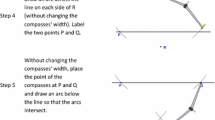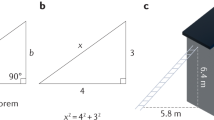Abstract
Attempts to train learning strategies have not produced marked or lasting increases in academic achievement probably because current training models fail to recognize the evolutionary nature of strategies acquisition. Empirical and theoretical evidence is presented supporting an incidental learning model that engineers the instructional environment following study skills training, so that students are prompted to recall and use strategies during study. At onset of spontaneous strategies initiation, prompts are faded gradually, to produce automatic processing. The model can be implemented on a very large scale as CAI, or as a somewhat less promising paper curriculum.
Similar content being viewed by others
References
Anderson, R. C., & Biddle, W. B. (1975). On asking people questions about what they are reading. In G. Bower (Ed.),Psychology of learning and motivation, 9 (pp. 89–132). New York: Academic Press.
Andre, T. (1979). Does answering higher-level questions while reading facilitate productive learning?Review of Educational Research, 49(2),280–318.
Ausubel, D. P. (1963).The psychology of meaningful verbal learning: An introduction to school learning. New York: Grune & Stratton.
Ausubel, D. P., Novak, J. D., & Hanesian, H. (1978).Educational psychology: A cognitive view (2nd ed.). New York: Holt, Rinehart, and Winston.
Bower, G. H. (1970). Analysis of a mnemonic device.American Scientist, 58, 496–510.
Bower, G. H. (1975). Cognitive psychology: An introduction. In W. K. Estes (Ed.),Handbook of learning & cognitive processes, Vol. 1 (pp. 25–80). Hillsdale, NJ: Erlbaum.
Briggs, L. J. (1977).Instructional design: Principles and applications. Englewood Cliffs, New Jersey: Educational Technology Publications.
Brown, A. (1978). Knowing when, where and how to remember: A problem of metacognition. In R. Glaser (Ed.),Advances in instructional psychology (Vol. 1) (pp. 77–165). Hillsdale, New Jersey: Erlbaum.
Brown, A. (1980). Metacognitive development and reading. In R. J. Spiro, B. C. Bruce & W. F. Brewer (Eds.),Theoretical issues in reading comprehension (pp. 453–481). Hillsdale, NJ: Erlbaum.
Brown, A. L., & Campione, J. C. (1982). Modifying intelligence or modifying cognitive skills: More than a semantic quibble? In D. K. Detterman & R. J. Sternberg (Eds.),How and how much can intelligence be increased (pp. 215–229). Norwood, NJ: ABLEX.
Bruner, J. S., Goodnow, J. J., & Austin, G. A. (1956).A study of thinking. New York: Wiley.
Cermak, L. S., & Craik, F. I. M. (Eds.) (1979).Levels of processing in human memory. Hillsdale, New Jersey: Erlbaum.
Collins, A. & Smith, E. C. (1982). Teaching the process of reading comprehension. In D. K. Detterman & R. J. Sternberg (Eds.)How and how much can intelligence be increased (pp. 173–186). Hillsdale, NJ: Erlbaum.
Cook, L. K., & Mayer, R. E. (1983). Reading strategies training for meaningful learning from prose. In M. Pressley & J. R. Levin (Eds.),Cognitive strategy research: Educational applications (pp. 87–126). New York: Springer-Verlag.
Craik, F. I. M., & Lockhart, R. S. (1972). Levels of processing: A framework memory research.Journal of Verbal Learning and Verbal Behavior, 11, 671–684.
Craik, F. I. M., & Tulving, E. (1975). Depth of processing and the retention words in episodic memory.Journal of Experimental Psychology: General, 104, 268–294.
Dansereau, D. F. (1978). The development of a learning strategy curriculum. In H. F. O’Neill, Jr. (Ed.),Learning strategies (pp. 1–29). New York: Academic Press.
Dansereau, D. F., Collins, K. W., McDonald, B. A., Diekhoff, G., Garland, J., Holley, C. S., Evans, S. H., Irons, D., Long, G., Walker, C., Hilton, T., Lehman, D., Halemanu, M., Ellis, A. M., & Fenker, R. M. (1978).Systematic training program for enhancing learning strategies and skills: Further development (AFHRL-TR-78-63). Lowry Air Force Base, Colorado: Air Force Human Resources Laboratory, Technical Training Division, September.
Dansereau, D. F., Collins, K. W., McDonald, B. A., Holley, C. D., Garland, J. C., Diekhoff, G. M., & Evans, S. H. (1979). Development and evaluation of an effective learning strategy program.Journal of Educational Psychology, 79(1),64–73.
Derry, S. J., & Murphy, D. (in press). Designing systems that train learning ability: From theory to practice.Review of Educational Research.
Federico, Pat-Anthony. (1980). Adaptive instruction: Trends and issues. R. E. Snow, Federico, P. & Montague, W. E. (Eds.),Aptitude, learning & instruction (Vol. 1) (pp. 1–26). Hillsdale, N. J.: Erlbaum.
Fredericksen, J. R. (1983). Computer games for training critical reading skills. Presentation, AERA, Montreal, Canada, 1983.
Gagne, R. M. (1977).The conditions of learning (3rd ed.). New York: Holt, Rinehart, and Winston.
Gagne, R. M. (1980a). Learnable aspects of human thinking. In A. E. Lawson (Ed.),The psychology of teaching for thinking and creativity. 1980 Yearbook, Association for the Education of Teachers in Science. Columbus, Ohio: ERIC Clearing House For Science, Mathematics, & Environmental Education, Ohio State U.
Gagne, R. M. (1980b). Learnable aspects of problem solving.Educational Psychologist, 15(2),84–92.
Gagne, R. M., & Briggs, L. J. (1974).Principles of instructional design. New York: Holt, Rinehart, & Winston.
Hirst, W., Spelke, E. S., Reaves, C. C., Caharack, G., & Neisser, U. (1980). Dividing attention without alteration or automaticity.Journal of Experimental Psychology: General, 109, 98–117.
Jones, B. F. (1983).Integrating learning strategies and text research to teach high order thinking skills in schools. Presentation, AERA, Montreal, Canada.
Marslen-Wilson, W. D., & Teuber, H. L. (1975). Memory for remote events in anterograde amnesia: Recognition of public figures from newsphotographs.Neuropsychologia, 13, 353–364.
McCombs, B. (1983).Motivational skills training: Helping students adapt by taking personal responsibilities and positive self-control. Presentation, AERA, Montreal, Canada.
McCombs, B. L., & Dobrovolny, J. L. (1982).Student motivational skill training package: Evaluation for air force technical training (AFHRL-TP-82-31). Lowry Air Force Base, Colorado: Logistics and Technical Training Division, December.
Meichenbaum, D. H. (1977).Cognitive behavior modification: An integrative approach. New York: Plenum Press.
Meichenbaum, D. H., & Cameron, R. (1974). In M. J. Mahoney, & C. E. Thoresen (Eds.),Self-control: Power to the person (pp. 263–358). Monterey, CA.: Brooks-Cole Publishing.
Neisser, U. (1976).Cognition and reality. San Francisco: Freeman.
Newell, A. (1980). One final word. In D. T. Tuma & F. Reif (Eds.)Problem solving and education. (pp. 184–187). Hillsdale, NJ: Erlbaum.
Norman, D. A. & Bobrow, D. G. (1975). On data-limited and resource-limited processes.Cognitive Psychology, 7, 44–64.
Ortony, A. (1975). Why metaphors are necessary and not just nice.Educational Theory, 25, 45–53.
Rickards, J. P. (1976). Stimulating high-level comprehension by interspersing questions in text passages.Educational Technology, November, 13–17.
Rigney, J. W. (1978). Learning strategies: A theoretical perspective. In H. F. O’Neil, Jr. (Ed.),Learning strategies (pp. 165–205). New York: Academic Press.
Rigney, J. W. (1980). Cognitive learning strategies and dualities in information processing. In R. E. Snow, P. Federico & W. E. Montague (Eds.),Aptitude, learning, and instruction (Vol. 1) (pp. 315–343). Hillsdale, NJ: Erlbaum.
Rood, M. M., & Weinstein, C. E. (1983). Improving higher-order learning skills: elaborative cognitive learner strategies training. Presentation, AERA, Montreal, Canada.
Rumelhart, D. E., & Norman, D. A. (1981). Analogical processes in learning. In J. R. Anderson (Ed.)Cognitive skills and their acquisition (pp. 335–359). Hillsdale, NJ: Erlbaum.
Sternberg, R. J. (1983). Criteria for intellectual skills training.Educational Researcher, 12(2),6–12.
Tulving, E. (1974). Cue-dependent forgetting.American Scientist, 62, 74–82.
Vaughan, E. (1981)Cognitive strategies: A review of some recent literature. (Contract No.: DABT60-81-C-006). U.S. Army Training Support Center.
Weinstein, C. E. (1978). Elaboration skills as a learning strategy. In H. F. O’Neil Jr. (Ed.),Learning strategies (pp. 31–55). New York: Academic Press.
Weinstein, C. E., Underwood, V. L., Wicker, F. W., & Cubberly, W. E. (1979). Cognitive learning strategies: Verbal and imaginal elaboration. In H. F. O’Neil & C. D. Spielberger, (Eds.),Cognitive and affective learning strategies (pp. 45–75). New York: Academic Press.
Author information
Authors and Affiliations
Rights and permissions
About this article
Cite this article
Derry, S.J. Strategy training: An incidental learning model for CAI. Journal of Instructional Development 8, 16–23 (1985). https://doi.org/10.1007/BF02906244
Issue Date:
DOI: https://doi.org/10.1007/BF02906244




